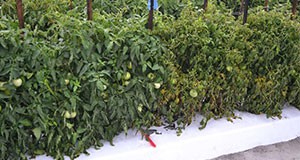Tobamoviruses are mechanically transmitted plant viruses that cause severe economic damage to vegetable and ornamental crops in Florida and worldwide. While certain tomato cultivars have genetic resistance to the most common tobamoviruses, no commercial tomato cultivars are resistant to tomato brown rugose fruit virus (ToBRFV), a recently described tobamovirus that also infects pepper and eggplant. It is currently unknown how ToBRFV may affect tomato production in Florida. This new 5-page publication of the UF/IFAS Plant Pathology Department describes symptoms of the virus, how it is different from other tobamoviruses, and how it is transmitted, as well as what to do if you think you have ToBRFV in your field. Written by Ozgur Batuman, Salih Yilmaz, Pamela Roberts, Eugene McAvoy, Samuel Hutton, Kishore Dey, and Scott Adkins.
https://edis.ifas.ufl.edu/pp360
Tag: Samuel Hutton
The Good, the Bad, and the Ugly: What the Future Could Hold for Bs2 Tomatoes
 Bs2 tomatoes are transgenic tomatoes that have been engineered to contain the Bs2 gene from pepper. As such, they are considered a genetically modified (GM) food, or a genetically modified organism (GMO). Numerous trials conducted by University of Florida researchers have shown the benefits of these cultivars for bacterial spot disease management, and growers and industry members recognize the potential for Bs2 tomatoes to make Florida tomato production more sustainable. This 4-page fact sheet discusses the benefits that might be realized by the adoption of Bs2 tomato varieties, and the challenges standing in the way of their commercial production. Written by S. F. Hutton, J. W. Scott, J. B. Jones, R. E. Stall, G. E. Vallad, B. J. Staskawicz, and D. M. Horvath , and published by the UF Department of Horticultural Sciences, April 2015.
Bs2 tomatoes are transgenic tomatoes that have been engineered to contain the Bs2 gene from pepper. As such, they are considered a genetically modified (GM) food, or a genetically modified organism (GMO). Numerous trials conducted by University of Florida researchers have shown the benefits of these cultivars for bacterial spot disease management, and growers and industry members recognize the potential for Bs2 tomatoes to make Florida tomato production more sustainable. This 4-page fact sheet discusses the benefits that might be realized by the adoption of Bs2 tomato varieties, and the challenges standing in the way of their commercial production. Written by S. F. Hutton, J. W. Scott, J. B. Jones, R. E. Stall, G. E. Vallad, B. J. Staskawicz, and D. M. Horvath , and published by the UF Department of Horticultural Sciences, April 2015.
http://edis.ifas.ufl.edu/hs1259
Compact Growth Habit Tomatoes
 Alternatives to the traditional production system that reduce production cost would be economically beneficial to the Florida tomato industry. Compact growth habit tomatoes are determinate varieties with a unique architecture that may provide the basis for a viable alternative production system for Florida. These tomatoes have low growth and spreading characteristics, forming compact plants that hold fruit above the ground on short branches. They do not require staking, tying, or pruning, so they may be used by the Florida mature-green fresh-market tomato growers to reduce labor costs. This 5-page fact sheet was written by Monica Ozores-Hampton, Aline Coelho Frasca, John Scott, and Samuel Hutton, and published by the UF Department of Horticultural Sciences, September 2014.
Alternatives to the traditional production system that reduce production cost would be economically beneficial to the Florida tomato industry. Compact growth habit tomatoes are determinate varieties with a unique architecture that may provide the basis for a viable alternative production system for Florida. These tomatoes have low growth and spreading characteristics, forming compact plants that hold fruit above the ground on short branches. They do not require staking, tying, or pruning, so they may be used by the Florida mature-green fresh-market tomato growers to reduce labor costs. This 5-page fact sheet was written by Monica Ozores-Hampton, Aline Coelho Frasca, John Scott, and Samuel Hutton, and published by the UF Department of Horticultural Sciences, September 2014.
http://edis.ifas.ufl.edu/hs1231
